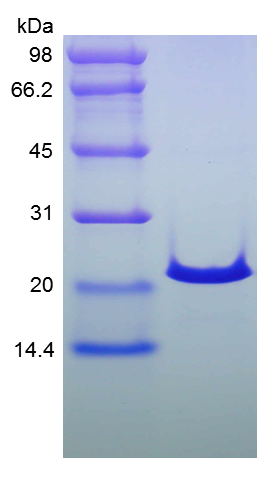- Synonyms
- HHG-1
- Source
- Escherichia coli.
- Molecular Weight
- Approximately 19.8 kDa, a single non-glycosylated polypeptide chain containing 176 amino acids.
- AA Sequence
- IVIGPGRGFG KRRHPKKLTP LAYKQFIPNV AEKTLGASGR YEGKISRNSE RFKELTPNYN PDIIFKDEEN TGADRLMTQR CKDKLNALAI SVMNQWPGVK LRVTEGWDED GHHSEESLHY EGRAVDITTS DRDRSKYGML ARLAVEAGFD WVYYESKAHI HCSVKAENSV AAKSGG
- Purity
- > 98 % by SDS-PAGE and HPLC analyses.
- Biological Activity
- Fully biologically active when compared to standard. The ED50 as determined by inducing alkaline phosphatase production of murine C3H/10T1/2 cells is less than 1 μg/ml, corresponding to a specific activity of > 1.0 × 103 IU/mg.
- Physical Appearance
- Sterile Filtered White lyophilized (freeze-dried) powder.
- Formulation
- Lyophilized from a 0.2 µm filtered concentrated solution in 20 mM PB, pH 7.4, 150 mM NaCl.
- Endotoxin
- Less than 1 EU/µg of rHuSHH as determined by LAL method.
- Reconstitution
- We recommend that this vial be briefly centrifuged prior to opening to bring the contents to the bottom. Reconstitute in sterile distilled water or aqueous buffer containing 0.1% BSA to a concentration of 0.1-1.0 mg/mL. Stock solutions should be apportioned into working aliquots and stored at ≤ -20 °C. Further dilutions should be made in appropriate buffered solutions.
- Stability & Storage
- Use a manual defrost freezer and avoid repeated freeze-thaw cycles.
- 12 months from date of receipt, -20 to -70 °C as supplied.
- 1 month, 2 to 8 °C under sterile conditions after reconstitution.
- 3 months, -20 to -70 °C under sterile conditions after reconstitution.
- Usage
- This material is offered by Shanghai PrimeGene Bio-Tech for research, laboratory or further evaluation purposes. NOT FOR HUMAN USE.
- SDS-PAGE

- Reference
- 1. Feijoo CG, Onate MG, Milla LA, et al. 2011. Eur J Neurosci, 33: 589-98.
2. Bear KA, Solomon BD, Roessler E, et al. 2012. Clin Dysmorphol, 21: 148-51.
3. Mukhopadhyay A, Krishnaswami SR, Cowing-Zitron C, et al. 2012. Dev Biol,
4. Zhang M, Wang H, Teng H, et al. 2010. Histochem Cell Biol, 134: 327-35.
5. Bayly RD, Brown CY, Agarwala S. 2012. Dev Biol, 369: 32-42.
- Background
- Sonic Hedgehog (SHH) is one of three proteins of the Hedgehog (Hh) family, which also contains Desert Hedgehog (DHH) and Indian Hedgehog (IHH). The three members share a high degree of amino-acid sequence identity (e.g., SHH and IHH are 93 % identical). SHH is expressed in fetal intestine, liver, lung, and kidney, but not in adult tissues. The protein consists of 462 a.a. with a 23a.a. signal peptide at N-terminus, and is further cleaved into SHH N-Terminus and C-Terminus. SHH has the most critical roles in development, acting as a morphogen involved in patterning many systems, including the limb and midline structures in the brain, spinal cord, the thalamus by the zona limitans intrathalamica and the teeth. In the absence of Sonic HedgeHog, patched receptor represses the constitutive signaling activity of smoothened. SHH-N retains all known signaling capabilities, and can be lipid-modified without receptor affinity reducing, but has more potent than the unmodified form. The rHuSHH has an N-terminal Ile-Val-Ile sequence substituted for the natural occurring chemically modified Cys residue.









 COA Application
COA Application


